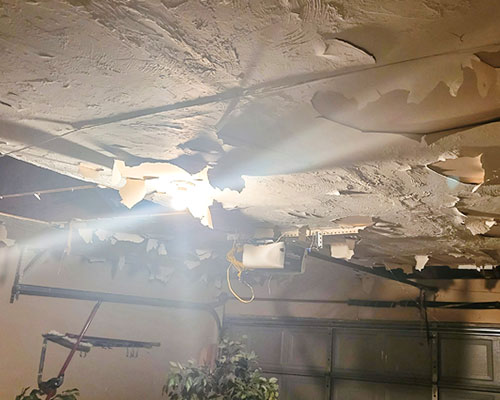Water Damage Causes at Home and How to Deal with Them
TUESDAY, JULY 11, 2017
We all know we're surrounded by water. The ocean, lakes, rivers, ponds, and other natural water reserves. But we are also surrounded by human-made waterways - sewers, water mains and pipes, and gutters also fill up with water when it rains. All this water is great, but can also cause a lot of damage.
Types of Water Damage Causes at Home
There are several types of water damage at home. Some can be prevented with simple maintenance, and some of them are just forces of nature doing their thing. Here are some of the water damages we helped people deal with over the years:
- Pipes leaks / bursts (or toilets) - Common reason for water damage at home. Pipes are usually hidden. Either in the floors, walls or just running on the outer walls of your home, they're far out of sight. If they start leaking it may take a few days (or even weeks) before you notice anything is wrong. These leaks create more damage as time goes by, so if you have any suspicion you've got a leaky pipe - call a plumber or water damage experts and have it checked. Better safe than drowning, right?
Want to know how to handle pipe leaks and pipe leak damage? Check our article about pipe leaks damage and restoration. - Broken appliances at home - some of our appliances are connected to water mains, use water, and when they break down - we are the ones who suffer. The usual suspects are dishwashers & washing machines, but refrigerators, freezers and aquariums can also be counted here. These causes usually cause less damage than pipe leaks, since they are usually visible almost instantly as they happen, and are not hidden in the walls. The most important thing to do when suffering such water damage is to extract the water as quickly as possible, before it gets absorbed in carpets or floors, and before the water damage becomes a health hazard and a mold growth bed which will be a lot harder (and way more expensive) to repair.
- Sump pump failure and toilet clogs - These are less common, but they do happen. When your sump pump fails in your basement, it creates an overflow of the toilets or sump basin in your basement, which is also harder to get rid of without professional equipment and water damage professionals.
- Sewage backup, or rising water from other water sources (seawater, lakes, rivers) - These reasons for water damage are in "Class 3" water damage, meaning the water contains lots of contaminants and unsanitary agents, causing a serious health hazard. These causes are usually accompanied by bad odors, and can cause discomfort and even sickness.
- Floods - these are really rare in most areas, and more common in some areas. Floods are considered as substantially large amounts of water reaching places they don't usually reach, such as places which are usually dry land like town centers, bridges and of course - your home. Floods are the hardest to deal with when it comes to water damage, because floods create a lot more damage to homes, and affect also access roads and facilities. Moreover, floods usually affect more than one home, and can flow over a whole town and even a city. Don't believe us? Here is a list of "the worst floods in U.S. history" showing exactly how devastating floods can be.
Water Damage at Home
Imagine you're at home. Sitting on your sofa, enjoying a good movie on the TV, having some popcorn, when you suddenly look up and see a discoloration on the ceiling. Nothing much, just some bubbles in the paint and a brownish stain of what looks like humidity. Nothing to really worry about, but where is it coming from?
You head up to the attic, only to realize your roof just gave in a little, and water is dripping in from your skylight. A drop every few seconds on days of constant rain can accumulate to large amounts of water that really have nowhere to go. So they get absorbed in your carpet or hardwood floors. And that's a problem. A big problem.
If you suffered from any type of water damage, it's important to remember 3 things:
- Get your belongings far from water ASAP - the longer they are in water, the less chances you have of saving them.
- Get the water extracted - water standing in your home is a bad idea for so many reasons. Get water extraction services and dry your property.
- Make sure the water didn't go any deeper - have water damage experts visit your property, inspect it thoroughly and verify there is no hidden water or wetness that can evolve into something worse.
We hope we've helped you deal with your water damage catastrophe, and that you'll have your life back to normal in no time. If you need any consultation, second opinion or water damage restoration, call us or at least make sure you know how to choose the right water damage restoration company.

Call now for an on-site evaluation and inspection for emergency services


On every job
CALL FLOOD DAMAGE PRO
